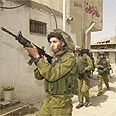After a lot of hesitancy and a short-lived attempt to take balanced positions, the worldwide left-wing has returned in full force to the "Jenin massacre syndrome."
To remind: Many of the worlds leading journalists described the fighting in Jenin during the spring of 2002 as a cold-blooded massacre of thousands of Palestinians by the brutal IDF. TV screens around the world featured Palestinian "eyewitnesses," who gave exact details of blood-curdling actions by IDF soldiers that never happened. TV reporters reported against a background of destroyed buildings as "evidence" from the field that Israel had mercilessly flattened an entire city and the refugee camp next to it.
It took months for human rights organizations, even the United Nations, to issue their reports refuting Palestinian claims. There was no massacre in Jenin, no ethnic cleansing, no intentional destruction of hospitals. There was a bloody battle in which soldiers died on each side.
Learning the lessons
The fairytale about the "Jenin massacre" may have died, but were lessons learned? Some were. The European media, especially the electronic media, has given some expression to the suffering of Israeli civilians under attack. It has not (usually) supported Hizbullah.
But in other cases, no lessons were learned from the blood libel of the Jenin massacre. During the second week of fighting, Israel's military campaign in Lebanon is currently being portrayed as the total destruction of Lebanon, of essential civilian infrastructure, as a human tragedy on the level of the 2004 tsunami that killed hundreds of thousands of people in Southeast Asia.
Reading reports from left-leaning field reporters, one gets a picture that Beirut has been destroyed at least as badly as Dresden was during the Second World War. Foreign television channels use one section of footage over and over, showing the destruction of one neighborhood in south Beirut, to "show" what has happened throughout the city.
The most worrying thing about the current anti-Israel wave is its' global scope: Leaders and opinion makers around Latin America, for example, have denounced Israel in some of the strongest terms imaginable. The UN Human Rights Commission has joined the chorus, as have international law organizations, cinema types, even journalists.
These claims, unfortunately, rest on the arrogant statements and bragging of several Israeli politicians and generals. Threats to "bomb Lebanon fifty years backwards" – statements intended for domestic consumption, and perhaps as part of the psychological warfare against the enemy – were picked up and broadcast by the world media as proof of Israel's destructive intentions.
The facts
And where is the truth in all this? The air force's bombing of Lebanon have caused, as always happens in war, damage and destruction, but this damage has been extremely limited. Israel has not "kicked Lebanon's ass," nor is there any intention to do so. In Beirut, to date, the airport has been hit, as have several strategic targets and buildings in the Shiite Quarter. That's a far cry from the descriptions of horror being played out nightly on television screens, and of charges of war crimes.
The situation in south Lebanon is worse because of the planned civilian flight. But Hizbullah has turned the whole of south Lebanon into a war zone, by blurring the distinction between military and civilian areas. The organization also aims its rockets at Israel's civilian population. Thus, civilians were forced to flee both southern Lebanon and northern Israel.
Still, talk of a "Lebanese nakba," a humanitarian disaster that any honest person would feel revulsion about, fails to reflect reality. It is no more than horror propaganda that many prefer to believe, including many Israeli journalists. Analysts repeat the claims without verifying the facts, and preach moral lessons and philosophies based on these claims.
More than numbers
The numbers, of course, don't tell the whole story: The death of even one innocent person is a terrible tragedy, and 50,000 refugees is an appalling horror. But statistics do have a public relations value.
As of this writing, some 360 Lebanese have been killed by Israeli military action, about half of them Hizbullah fighters (as opposed to official Lebanese statistics). After two weeks of bombing, these numbers tell the story of low-level war. There is no "destruction of Lebanon," just like there was no "Jenin massacre."
In 2006, because of the mistaken approach that "the world is with us," because of the different character of the fighting and psychological and diplomatic reasons, the facts have been abandoned. This is a mistake, one that works against Israel with opinion makers around the world.

















